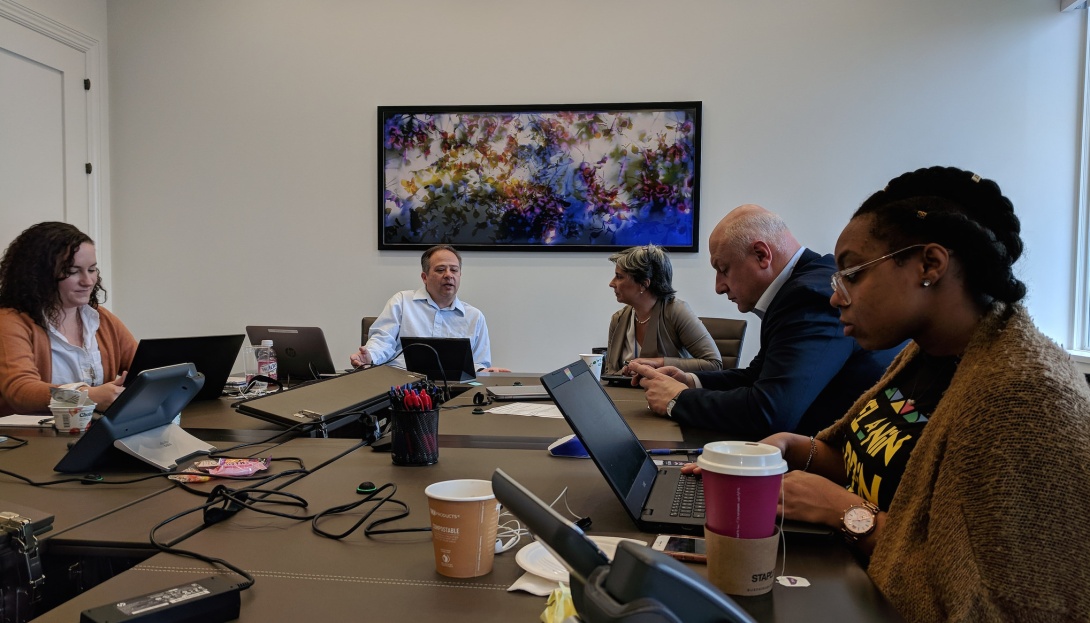Southern midterms marred by voting problems

Isabel Santos (middle) and George Tsereteli (second from right), election observers with the Organization for Security and Cooperation in Europe, met with lawyers and volunteers at the Election Protection center in Washington on Election Day 2018. This year the center helped more than 31,000 voters with problems they encountered at the polls. (Photo from OSCE Parliamentary Assembly via Flickr.)
After this year's hotly contested midterm elections, pressing questions have emerged about the integrity of the voting process in Southern states.
Voters across the region were forced to endure long lines, closed polling places, malfunctioning voting machines, and voter intimidation. There were also complaints about voting machines flipping voters' choices in North Carolina, South Carolina and Texas. Faulty machines also impeded voters in North Carolina and Texas, while registration issues were reported in Georgia and Tennessee.
Civil rights groups and election officials responded to thousands of reports of voting irregularities across the country. For example, Election Protection, the nation's largest nonpartisan voter protection coalition, assisted more than 31,000 voters on Election Day through its hotlines. It identified problems including a lack of preparation by election officials and voter suppression tactics.
Because of these problems, many voters were forced to cast provisional ballots, which aren't always counted. In North Carolina, more than 35,000 voters were offered provisional ballots this year, while the unofficial count in Georgia surpassed 21,000.
"Much work remains to be done to strengthen and improve the way elections are run in our country to ensure that no eligible American is disenfranchised or silenced," said Kristen Clarke, president and executive director of the Lawyers' Committee for Civil Rights Under Law, which leads Election Protection. She added that "some officials remain bent on locking out voters of color."
Here are some of the specific issues voters around the South faced during early voting and on Election Day:
- With recounts underway in Florida for the close U.S. Senate and gubernatorial races, reports of voting problems continue to surface. Voters there faced machine glitches, problematic ballots, and long lines. In Miami-Dade County during the final hours of early voting, voters waited in long lines after ballot-printing machines malfunctioned. Other voters were turned away from polling places because of inconsistencies with signatures on identification cards.
- Voters also encountered problems in Georgia, where a narrow margin separates Democratic gubernatorial candidate Stacey Abrams from Republican Brian Kemp, who oversaw the election as secretary of state. The governor's race generated much enthusiasm and heavy turnout, leading to the extension of voting hours to accommodate long lines at some polling precincts. In Fulton County, home to Atlanta, some voters waited three hours to cast ballots after local election officials sent only three voting machines to serve more than 3,000 registered voters. In Gwinnett County, part of the Atlanta metro area, defective machines forced poll workers to pass out provisional paper ballots until the devices could be replaced.
- In North Carolina, voters in populous Wake and Cumberland counties encountered problems with machines failing to accept ballots when voters tried to insert them — a problem that state election officials attributed to high humidity and large ballot size. Similar problems also occurred in rural Halifax County.
- Voters in Tennessee faced long lines and power outages. In Davidson County, home of Nashville, turnout was 109 percent higher than in the 2016 presidential election, contributing to long waits. One polling place in Knoxville lost power on Election Day following overnight storms, forcing voters to cast paper ballots outside.
- In Texas, voters reported that electronic voting machines switched selections for Democratic candidates to Republicans. Experts blamed the errors on outdated software and machines, some purchased as long as 15 years ago. The technological issues also contributed to long lines, leading a federal judge to order officials to keep nine polling locations near Houston open an extra hour longer. There were also reports of voter intimidation during early voting in Dallas County that included name-calling and interrogating of voters waiting in line.
"This election proves American people want a 21st century democracy but are standing in lines caused by antiquated and malfunctioning machines trying to overcome districts that require a historic turnout to be competitive," said Karen Hobert Flynn, president of the voting rights advocacy group Common Cause.
Tags
Benjamin Barber
Benjamin Barber is the democracy program coordinator at the Institute for Southern Studies.
